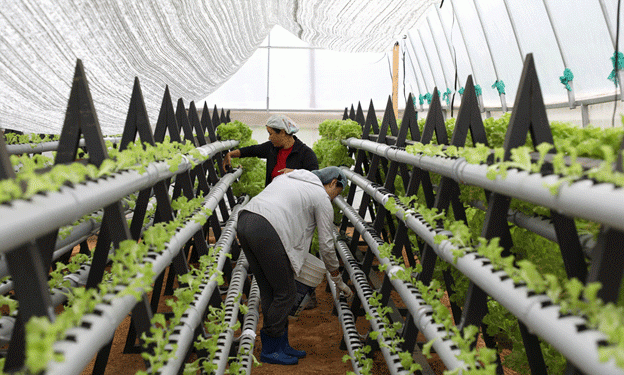The COVID-19 pandemic brought economic devastation to countless families around the world. For Kinley Wangmo, a mother in Bhutan, the crisis served as an unexpected catalyst for innovation. Faced with dwindling sources of income, Kinley turned to hydroponics farming, an advanced method of growing plants in nutrient-rich water without soil. What began as a personal quest for sustainable food production has now grown into a burgeoning agricultural business, providing food security, income, and employment opportunities in Bhutan’s capital, Thimphu.
Hydroponics offers several advantages over traditional farming, especially in land-scarce countries like Bhutan. This method consumes less water and space while producing higher yields, and it can operate year-round in controlled environments like greenhouses. This makes it particularly valuable for Bhutan, where food insecurity affects approximately one-third of the population, and fragmented land holdings, urbanization, and climate change continue to challenge the agricultural sector. Kinley Wangmo recognized this potential and began to tailor hydroponic systems to fit the specific needs of Bhutanese farmers.
Kinley’s previous experience as a contractor, skilled in plumbing and electrical work, played a key role in her ability to build a hydroponics system suited for Bhutan’s mountainous terrain. Using locally available materials and the deep flow technique, she created a low-cost, efficient system that recycles water through a series of pipes. Unlike imported systems, which can be prohibitively expensive, her system is accessible and easy to maintain, making it ideal for small-scale farmers.
By 2020, she had launched Bhutan Hydroponics, operating out of a small greenhouse in Thimphu. Her enterprise gained significant traction in early 2024, when Kinley received funding support from the Food and Agriculture Organization (FAO) as part of its Peri-urban and Urban Farming project, in collaboration with Bhutan’s Ministry of Agriculture and Livestock. The support provided land development assistance, greenhouse installation, seeds, and equipment, further accelerating her venture’s growth.
Kinley now operates three greenhouses, primarily growing lettuce, a crop she and her team have successfully harvested three times in five months. Her business supplies local hotels and urban markets, ensuring a steady income while offering high-quality, locally grown produce. Her success is not only a personal achievement but a model for addressing Bhutan’s larger food security issues.
“Hydroponics helps plants grow faster and uses less space than traditional soil farming,” Kinley explains. “In a greenhouse, we can control every aspect to ensure optimal plant growth.” This precision farming technique has the potential to reshape Bhutan’s agricultural landscape, especially in urban areas where food security is a pressing concern. With more young adults moving from rural areas to cities, the need for local food production is more urgent than ever.
The government, too, recognizes this necessity. Bhutan’s Department of Agriculture has been actively promoting urban farming as a solution to food security issues. FAO’s project aims to bring food production closer to consumers in cities while creating jobs and income opportunities, particularly for women and youth. Kinley is a passionate advocate for this movement, employing nine people—mostly single mothers and young adults—in her growing business.
Hydroponics not only addresses practical issues like land scarcity and water use but also makes agriculture more appealing to younger generations. As Kinley puts it, “Technology in agriculture reduces the physical effort and makes it cleaner, which can attract more young people and women into farming.” By integrating technology with traditional agricultural practices, she hopes to inspire a new generation of farmers in Bhutan, eager to embrace innovation and sustainability.
Looking ahead, Kinley has ambitious plans for expanding her business. She intends to cultivate three additional varieties of lettuce and hire more staff to meet the growing market demand. Her vision for the future includes fostering greater self-sufficiency in Bhutan’s urban areas by making fresh, locally grown produce accessible to everyone.
Kinley Wangmo’s journey from pandemic hardship to agricultural innovation is a testament to the transformative power of hydroponics. By customizing this technology for Bhutan’s unique needs, she is not only addressing critical food security issues but also paving the way for a new generation of farmers. Her efforts exemplify how small-scale, sustainable farming techniques can have a large-scale impact, especially in regions facing agricultural challenges due to land fragmentation, urbanization, and climate change.











